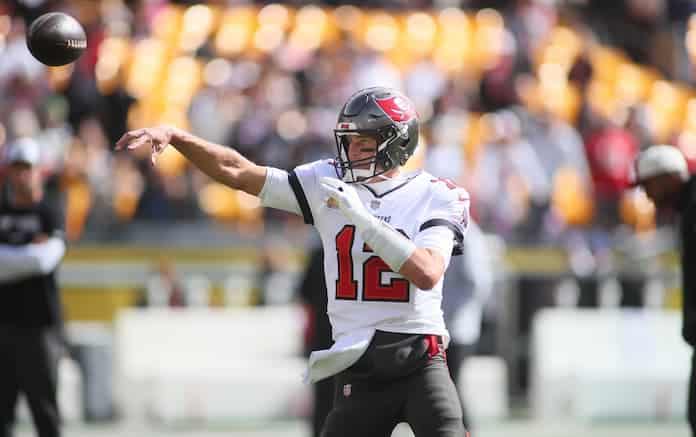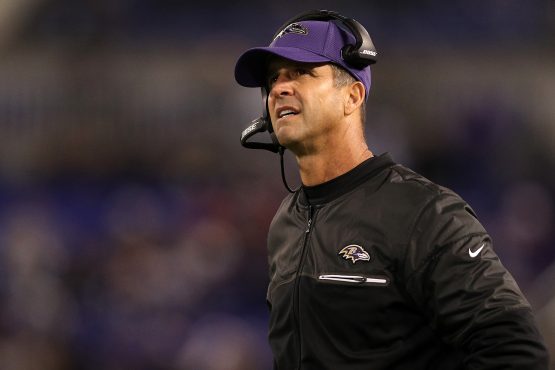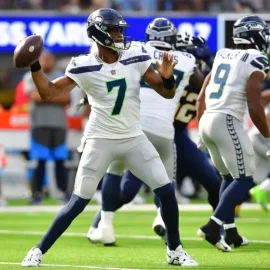The most important job for NFL Quarterbacks is to not turn the ball over.
In a league where possessions come at a premium, teams that lose the turnover battle often lose the game as well.
Even for the best NFL teams, it is very difficult to overcome losing the turnover battle.
To combat the issue, play-calling in the passing game has become more conservative in recent years.
As a result, quarterbacks are on pace to throw the fewest interceptions in NFL history but there have been a few other unintended implications.
Passing attempts and passing yards per game are down to there lowest marks in more than a decade. Meanwhile, yards per completion have dropped to the lowest mark in NFL history.
Below, we will break down the recent trends in the NFL passing game and give a few reasons for the dip in production.
NFL Teams Are Averaging Fewest Pass Attempts Per Game Since 2009
Even though the NFL is considered to be a passing league, teams are averaging the fewest pass attempts per game (33.5) since 2009.
Despite the drop in attempts, NFL quarterbacks have managed to remain effective, according to a few other metrics.
Completion percentage (64.6%) and quarterback rating (90.4) represent the fourth-highest marks in history in 2022.
It’s an analytics-driven league and teams are throwing shorter passes, which has helped keep completion percentage and quarterback rating on the rise despite the drop in attempts.
Passing Yards Per Game Reach Lowest Average Since 2010
With pass attempts being the lowest since 2009, it should come as no surprise that passing yards per game are at their lowest mark since 2010.
Many defenses have prioritized getting pressure on opposing signal callers, and as a result, quarterbacks are getting the ball out quicker.
Wide receivers are running shorter routes so that QBs don’t have to hold on to the ball for too long, which also means teams are generally taking fewer shots downfield.
As a result, receivers have also seen a dip in production.
Receiving yards per game is the lowest since 2009.
With defenses focusing more on stopping the pass and teams choosing to throw shorter passes, passing yards have been on the decline for the third consecutive year.
Yards Per Completion Tied For Lowest Mark Ever (2021)
Passing yards and attempts aren’t the only metrics that have been affected by changes in the league’s philosophy.
In 2022, teams are averaging just 11.0 yards per completion, tied for the lowest mark in NFL history.
Ironically, the last time that yards per completion were this low was last year in 2021.
However, this is part of a longer term trend, as the 2020 season marked the next-fewest yards per completion in league history.
Defenses are taking away the deep ball and quarterbacks are throwing shorter passes to negate the pass rush.
Despite yards being down for QBs and wide receivers, QBs have been ultra-efficient this season.
INT% And INT Per Game On Pace For Lowest Mark Ever
Not everything in the NFL passing game is trending in the wrong direction though.
Due to shorter passes being thrown, interception percentage and interceptions per game are on pace for the lowest mark in NFL history.
While passing yards per game reached their lowest average since 2010, and yards per completion is currently tied for the lowest mark ever, quarterbacks are simply not throwing interceptions.
Losing the turnover battle can turn wins into losses and NFL teams have compensated for this idea by prioritizing taking care of the football.
Teams are opting for shorter passes and fewer pass attempts instead of slinging the ball downfield and throwing interceptions.
Recent trends indicate fewer interceptions will be thrown in the future too, especially as more teams continue to have success in the run game.
The top seven years for the fewest interceptions per game are from 2016-2022.
The top seven years for the fewest interception percentage are 2022, 2021, 2020, 2019, 2018, 2016, and 2015.
With the way quarterbacks are being asked to play, interceptions will continue to trend downward for the foreseeable future.
Add The Sports Daily to your Google News Feed!







